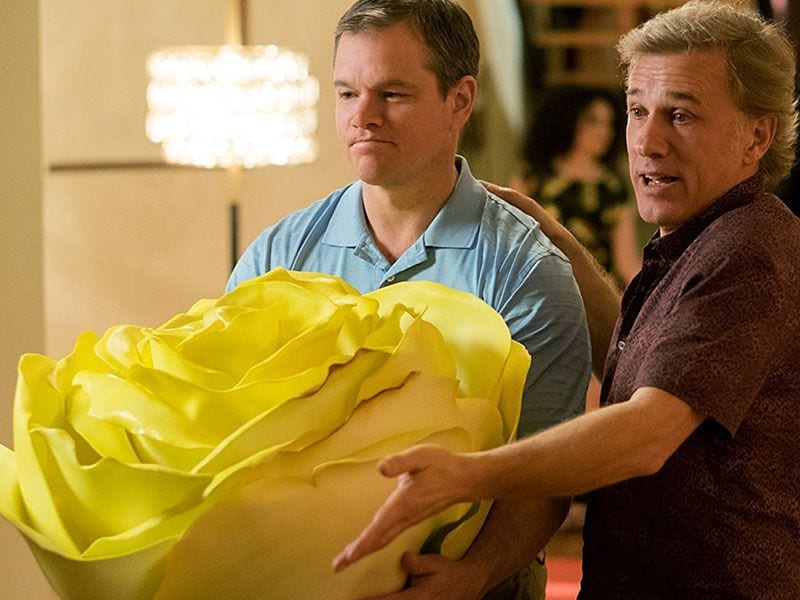
Downsizing, the new social satire from director Alexander Payne, is a premise in search of a story. The satirical potential of an over-populated world shrunken to the size of ants is completely squandered in favor of superficial social commentary and some mildly amusing sight gags. Payne, an expert at observant, character-driven drama, feels overmatched by this High Concept yawner. It’s a huge miscalculation by the normally reliable director and qualifies as one of 2017’s most baffling misfires.
It’s challenging to tell absorbing stories about directionless heroes who have no discernible personality. Paul Safranek (Matt Damon) certainly qualifies on both counts. His entire life is a succession of soul-crushing compromises. He wanted to be a surgeon but settled for being an occupational therapist. His wife Audrey (Kristen Wiig) pines for a bigger house and a new baby, but Paul can’t square away the finances. Now middle-aged, Paul can clearly see the trajectory of his life nosediving into a massive pile of… disappointment.
When a team of European scientists discovers the secret of miniaturization, Paul sees a way to finally secure the material possessions that he and Audrey crave. “Getting small”, as it’s called, is the sexy new way to be environmentally conscious while still pampering yourself at a greatly reduced price. Thousands of dollars in the ‘big world’ equals millions in dollars at Leisureland; the hot property for trendy shrunken people. Of course, such highly-specialized living conditions would likely cost its residents more money, but Payne and his co-writer Jim Taylor can’t allow basic economic principles to interfere with their thematic agenda.
This thematic agenda, which seems to caution against a preoccupation with materialistic desires in favor of simpler (unseen) pleasures, is undeniably admirable. There’s no denying that America needs a few lessons on the inherent ugliness of White Privilege. The problem lies in the execution. No premise or theme, no matter how clever or well-meaning, is exempt from the burden of being entertaining. Frankly, Downsizing fails to check any of the boxes that qualify it as a worthwhile cinematic experience.
There are no stakes or goals to hold your attention. Each character is ham-fistedly created for the sole purpose of eliciting a specific, superficial emotional response. No one is afforded a character arc because there’s no plot. Paul simply drifts from situation to situation, meeting new people who throw his life into illogical and improbable directions. He’s a secondary character in his own story, which wouldn’t be so bad if there were other compelling characters to pick up the narrative slack. Apparently, those characters were downsized out of existence.
Maribeth Monroe and Kristen Wiig in Downsizing (2017) (Photo credit: Paramount Pictures – © 2017 Paramount Pictures. All Rights Reserved. / IMDB)
Payne has a long list of impressive credits, including undisputed classics like Sideways (2004) and Nebraska (2013). He’s the master of the mopey sad sack; heroes in need of a good shaking as they try to navigate through their self-absorbed malaise. They frustrate and inspire, always inviting you to embrace their plight. The beauty of Payne’s characters is that they remain universal while still forging their own unique identity.
With Downsizing, Payne’s inability to capitalize on his heady science-fiction premise clouds the human drama that usually punctuates his films. The entire first act is comprised of explaining the miniaturization process and Paul’s knee-jerk decision to undergo the procedure. Admittedly, some of these scenes contain amusing sight gags, as when spatulas flip newly miniaturized citizens as they lay unconscious on the operating table.
All of this meticulous detailing offers limitless opportunity for fascinating and challenging satire. After Paul is miniaturized and takes up residence in his exorbitantly appointed mansion, we can’t wait to watch the assimilation process. What is it like to be the size of a LEGO? What are the health impacts? Will Paul have regrets? Dozens of questions beg to be explored with Payne’s incisive lens.
Instead, we get a title card that reads, “One Year Later,” and find Paul already entrenched in his new life. What?
From this point forward, the carefully constructed premise is abandoned in favor of random, disconnected scenes interspersed with lazy sermonizing. Paul meets his wacky neighbor (Christoph Waltz as ‘Dusan’), who just happens to have a housemaid (Hong Chau) who is a political dissident from Thailand, who steals food and medical supplies to help the miniaturized people living in a ghetto outside of Leisureland. Were this idea of ghettos and economic disparity explored with any depth, it might have yielded some satirical fruit. The lack of narrative cohesion, however, leaves us wondering if the segregation is a result of economic injustice or some insidious plot to make society’s undesirables ‘disappear’.
Even the actors seem confused as to what’s happening. As Paul talks to a whacked out environmentalist who’s preparing for the end of the world (yes, this eventually happens), Dusan eavesdrops in the background. Unsure if he’s supposed to find this discussion funny, weird, serious, scary, or outrageous, Waltz twists uncomfortably somewhere between bemused grin and disdainful frown. It’s painful to see an accomplished actor like Waltz appear so insecure on the screen.
Perhaps the true failure of Downsizing is ironically summarized by Paul himself, who comments “sometimes you think we’re in the normal world and then something happens and you realize we’re not.” This perfectly describes the last half of Downsizing, which, save for a few unconvincing miniatures, is completely oblivious to its own miniaturization premise. This failure prevents Payne from using the miniaturization as metaphor or symbolism for his themes. There are no laughs, there is no drama, and no one learns anything. In other words, this film fails as both entertainment and social commentary.
Alexander Payne will do good work again, but Downsizing is more than a tiny blemish on his resume.


